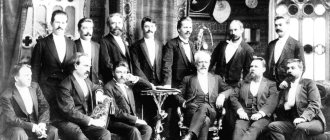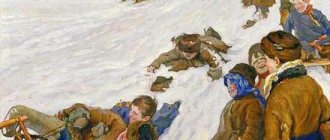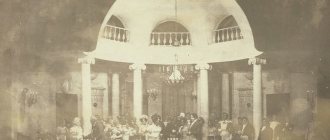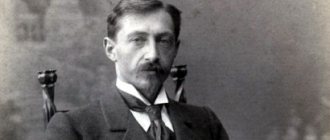PICTURES OF THE CIVIL WAR IN SHOLOKHOV’S NOVEL “QUIET FON” lesson plan on literature (grade 11)
PICTURES OF THE CIVIL WAR IN SHOLOKHOV’S NOVEL “QUIET FON”
Objectives: to determine the methods of depicting pictures of the Civil War in Sholokhov’s novel, to trace how the tragedy of an entire people and the fate of one person are intertwined, how the problem of humanism is reflected in the epic.
During the classes
I. Introductory conversation.
– You have already become acquainted with M. A. Sholokhov’s novel “Quiet Don”. What is this book about?
You already know that the focus of the author of the novel “Quiet Don” and his readers is the fate of the Russian people, more precisely the Don Cossacks.
Already in the title of the epic novel by M. A. Sholokhov there is a symbolic meaning. The Don is a flat river, quiet and calm. In bad weather, it is violent and dangerous, like the sea, like the ocean. It covers Grigory and Aksinya with a terrible wave while fishing, like an element of passion that united their destinies. In winter, Pantelei Prokofievich Melekhov’s horse and sleigh instantly falls into the wormwood, and he himself is miraculously saved...
In the ancient Cossack songs about the father “quiet Don”, who is sometimes “clean”, sometimes “muten”, the main contradiction inherent in the Cossack tribe is concentrated, combining in the same people the incompatible: the most peaceful creative profession of the tiller with military valor, with constant readiness for war, and therefore death and destruction.
– What do you know from the history of the Cossacks?
Historically, the Cossacks are a freedom-loving people; Russian rebels - Stepan Razin, Emelyan Pugachev from the Cossacks. But the most faithful, selected tsarist troops who suppressed revolutions and carried out pogroms were the Cossack hundreds. The units that were the first to march across the battlefield during the First World War were the Cossack hundreds.
These contradictions appear even more acutely in bitter times, when the Don becomes the site of a fratricidal war and no longer divides the shores, but the people, bringing terrible news to the Cossack kurens. This is the theme of war. This is what Sholokhov's novel is about.
There are also battle scenes in the “military” chapters, but they are not interesting to the author in themselves. The writer solves the “man at war” conflict in his own way. In “Quiet Don” we will not find descriptions of exploits, admiration of heroism, military courage, or delight in battle, which would be natural in a story about the Cossacks. Sholokhov is interested in something else - what war does to a person.
II. Text-based lecture.
“Quiet Don” is a novel about the fate of the people at a turning point. Getting to know the heroes of the work, we will notice each of them has their own ability to experience and comprehend the war, but everyone will feel the “monstrous absurdity of war.”
1. Student report about the portrayal of World War I in the novel.
The antithesis of peaceful life in “Quiet Don” will be war, first World War I, then Civil War. These wars will take place in villages and villages, each family will have casualties. Starting from the third part of the novel, the tragic determines the tone of the narrative. This motive already sounds in the epigraph and is indicated by the date “In March 1914...”
The chain of short episodes, the alarming tone conveyed by the words: “flare”, “mobilization”, “war” - all this is connected with the date - 1914. The writer puts the word “War” twice in a separate line... “War!” Pronounced with different intonations, it makes the reader think about the terrible meaning of what is happening. This word echoes the remark of an old railway worker who looked into the carriage where “Petro Melekhov was steaming with the other thirty Cossacks”:
“- My dear... beef! “And he shook his head reproachfully for a long time.”
The emotion expressed in these words also contains a generalization. It is expressed more openly at the end of the seventh chapter: “Echelons... Echelons are countless! Through the arteries of the country, along the railways to the western border, agitated Russia is driving grey-overcoat blood.”
Through the eyes of the Cossacks we will see how “the ripened grain was trampled by the cavalry,” how a hundred “crushed the bread with iron horseshoes,” how “the first shrapnel covered the rows of unharvested wheat.” And everyone, looking at the “unharvested shafts of wheat, at the bread lying under the hooves,” remembered his tithes and “hardened his heart.” These flood memories illuminate, as if from the inside, the dramatic situation in which the Cossacks found themselves during the war.
The episode “Gregory Kills the Austrian” (Part 3, Chapter 5) is being re-read.
After reading the episode, I remember the words of L.N. Tolstoy: “War is madness.” Madness not only because it devalues life, but also because it cripples the soul and clouds the mind.
It is “inflamed by the madness that was happening all around” that Grigory Melekhov will rush with a saber at the Austrian, unconscious from fear, “without a rifle, with a cap clutched in his fist” (book 1, part 3, chapter 5).
Feeling his defenselessness, the Austrian in Sholokhov’s depiction is doomed to death: “The square face of the Austrian, elongated with fear, turned cast iron black. He held his hands at his sides, often moving his ashen lips... Grigory met the Austrian’s gaze. Eyes filled with mortal horror looked at him deathly..."
A terrible picture in all its details will remain before Gregory’s eyes for a long time, painful memories will bother him for a long time. When meeting his brother, he admits: “I, Petro, have lost my soul. I’m so unfinished... It’s as if I’ve been under a millstone, they crushed it and spat it out... My conscience is killing me...”
Gregory watched with interest the changes taking place with his comrades in the hundred: “Changes took place on every face, each in his own way nurtured and nurtured the seeds sown by the war.” The author draws our attention to those whom he considers “morally crippled” by the war.
Through Grigory’s eyes, the reader will see the “pain and bewilderment” lurking in the corners of Prokhor Zykov’s lips, will notice how Grigory’s fellow farmer Emelyan Groshev “charred and turned black, and laughed absurdly”, will hear how Yegorka Zharkov’s speech was filled with “heavy obscene curses.”
The most ominous figure will, of course, be Alexei Uryupin, nicknamed Chubaty, who teaches Gregory not so much the “complicated striking technique” as the easy killing technique: “Cut a man boldly. He is soft, a man like dough... You are a Cossack, your job is to chop without asking. In battle, killing an enemy is a sacred thing... He is a filthy man... evil spirits, he stinks on the earth, he lives like a toadstool mushroom” (book 1, part 3, chapter 12).
The changes in Gregory himself were striking: he was “bent ... by the war, sucked the color from his face, painted him with bile.” And internally he became completely different: “The heart became coarsened, hardened, like a salt marsh in a drought, and just as a salt marsh does not absorb water, so Gregory’s heart did not absorb pity... he knew that he would no longer laugh as before; he knew that it was difficult for him, when kissing a child, to look openly into clear eyes; Gregory knew what price he paid for the full bow of crosses and production” (part 4, chapter 4).
The author’s voice bursts into the epic narrative: “The native kurens were imperiously drawn to themselves, and there was no such force that could keep the Cossacks from their spontaneous desire to go home.” Everyone wanted to visit home, “just have a look.” And, as if fulfilling this desire, Sholokhov draws a farmstead, “bloodless like a widow,” where “life was being sold - like hollow water in the Don.” The author's text sounds in unison with the words of an ancient Cossack song, which became the epigraph of the novel.
So, through battle scenes, through the acute experiences of the heroes, through landscape sketches, descriptions and generalizations, and lyrical digressions, Sholokhov leads us to comprehend the “monstrous absurdity of war.”
2. Sholokhov’s depiction of paintings of the Civil War.
Teacher. The writer B. Vasiliev gives his assessment of the novel “Quiet Don”, interpreting the essence of the civil war in his own way: (can be written on the board and in notebooks): “This is an epic in the full sense of the word, reflecting the most important thing in our Civil War - monstrous fluctuations, the throwings of a normal, calm family man. And this was done, from my point of view, superbly. One fate shows the entire breakdown of society. Even if he is a Cossack, he is still first and foremost a peasant, a farmer. He is the breadwinner. And the breakdown of this breadwinner is the whole Civil War in my understanding.” Sholokhov's novel is concretely historical in its plot. Donshchina is the center of gravity of all events. Villages, farms along the banks of the Don, Khopr, Medveditsa. Cossack kurens. Wormwood steppes with a nesting horse hoof print. Mounds in wise silence, preserving the ancient Cossack glory. The region where the civil strife of the Civil War was so devastating. The novel contains the history of the Don itself, verified, documented - actual events, historical names, exact dating, orders, resolutions, telegrams, letters, absolutely accurate routes of military campaigns. The fates of the heroes are correlated with this historical reality.
Some researchers of the novel, touching on the tragic events on the Don, blamed the Cossacks. There is truth in this. But far from complete. The Don problem was hotly discussed already in the 20s and 30s. V. A. Antonov-Ovseenko, for example, in the book “Notes on the Civil War,” speaking about the precarious behavior of the peasantry in the Don, Ukraine and other places, noted among the reasons not only the economic basis of the middle strata of the population, but also the fact that increased hesitations and caused excesses: excesses in the implementation of land policy, the forced establishment of communes, tactlessness on the part of some leaders who did not take into account the indigenous population, the gangster behavior of the “anarchist rabble” who joined the Red Army detachments.
Sholokhov talks about the difficult moral state of the people, who experience cruelty from both the “reds” and the “whites”. The author does not forgive anyone for cruelty. And she was everywhere. Cossack Fyodor Podtelkov carried out lynching of the captured officers, chops up Captain Chernetsov, and then, losing all self-control, gives the command: “Chop them all!” Sholokhov does not forgive this, nor does the no less reckless and even bloodier trial in the Ponomarev farmstead - the execution of Podtelkov and the entire detachment. He does not forgive the sadist Mitka Korshunov for the reprisals against captured Red Army soldiers and the old woman, the mother of Mikhail Koshevoy. But there is no justification for many of Koshevoy’s own actions: remember how he executed the hundred-year-old grandfather Grishaka, who enjoyed universal respect in the farmstead for his selflessness and justice, and set fire to the Cossacks’ smoking areas.
Many in 1928 were surprised by something unusual in our literature - the ending of the Second Book of the novel. The Civil War is raging on the Don. Red Guard Valet dies. The Yablonovsky Cossacks buried him. “Soon an old man came from a nearby farm, dug a hole at the head of the grave, and erected a chapel on a freshly planed oak abutment. Under its triangular canopy, the mournful face of the Mother of God glowed in the darkness; below, on the eaves of the canopy, black script of a Slavic letter fluttered:
In a time of turmoil and debauchery
Don't judge your brother, brothers.
The old man left, but the chapel remained in the steppe to grieve the eyes of passers-by with an eternally sad look, to awaken inarticulate melancholy in the hearts.”
– What is the essence of such a finale?
The point was that Sholokhov recalls the desire of the people to establish moral standards that have developed over centuries and are often associated with images of religious origin. The mournful face of the Mother of God and the inscription said that it was time to stop the discord and bloodshed, the fratricidal war, to stop, come to your senses, find harmony, and remember the purpose of life, which nature affirms.
III. Bottom line. Creative work.
What are your impressions of the pictures of the “monstrous absurdity of war”?
Write your reasoning using the words as an epigraph
In a time of turmoil and debauchery
Don't judge your brother, brothers.
Homework.
Prepare (in groups) for a seminar in the image of Grigory Melekhov, the main character of Sholokhov’s novel “Quiet Don”.
Influence on the people
In order to understand the feelings of people in such a tragic time, you need to pay attention to what life was like before and after these events. Before the start of the war, the Cossacks in the novel “Quiet Don” lived a calm and measured life, engaged in farming, and raised children. But now the time comes to choose the side of the Reds or the Whites and go to the front. It’s hard to make such a decision, because both of them are compatriots. Some deny faith and promise brotherhood and communism, while others are adherents of the old system, under which everyone lived in peace and tranquility.
Fateful decision
During the war, people maimed not only their bodies, but also their souls. A clear proof of this is Grigory Melekhov. The hero himself always opposed violence and bloodshed, was not tough and rude, and, having killed the Austrian, does not consider that he committed a heroic act.
Grigory spends many nights in thought, regrets what he did, he is consumed by a sense of injustice, because that man is just a pawn in the big game of the ruling elite, he has a family, perhaps children, he asked for mercy and extended his hands as if asking for alms. The hero no longer wants to kill, but knows that if he does not do this, he himself will become a victim.
Gregory is constantly tormented by emotional experiences, he suffers. Over time, the hero becomes tougher at the front, but he is still shaken to the core by the brutal massacres and murders of innocent people. War embitters everyone, regardless of age and gender. So, Daria Melekhova, without hesitation, takes the life of her husband Peter, whom she considers a murderer. The hardest thing for the people is misunderstanding and confusion; people do not know which side to fight on and which leader to follow.
Execution of Podtelkovtsev
This scene of cruelty was one of the most striking. People who previously lived side by side in complete harmony and peace are mercilessly exterminating each other because of the ideology imposed on them. The death of the condemned was long and painful, because the perpetrators did not take the preparation of the gallows seriously. The feelings of people during the execution are colorfully depicted through the experiences of Grigory Melekhov: the hero fled because he was ashamed and afraid of the injustice of what was happening, he left the place with an acute feeling of pain and alienation.
But not only Melekhov was horrified by everything that was happening. After the hanging of the first condemned, desperate cries of wives, mothers and daughters, who had just lost their relatives and friends, were heard everywhere.
The main tragedy of the people
War is a difficult time. It is not only cruelty and fratricide that make it so terrible, but also many other reasons. The main tragedy of the people is this:
- Misunderstanding of the meaning of war . It, forcing you to kill your fellow men, is already terrible, but when you don’t even know what you are fighting for and what ideology you are pursuing, it becomes much worse. The meaninglessness of the sacrifices becomes unbearable.
- Choosing a side . Some heroes were never able to do it, for example, Grigory Melekhov, who until the very end of the war rushed from white to red and vice versa, completely not understanding who to give preference to.
- Fratricide . Taking the life of a person with whom you lived side by side in times of peace becomes an unbearable burden for everyone. Often in one family with two sons, one belonged to the whites and the other to the reds.
- Lack of choice . The main rule in war is that either you get killed or you get killed. No matter how much a person wants to leave the enemy alive, he cannot do this, because in this case the end will come for him: he will either be killed by the enemy, or by an ally - he will be hanged for desertion.
- What will be the outcome? Every soldier who goes to the front destroys enemies and buries loved ones. As a result, he never knows what will happen as a result of the war, how his life and the fate of people in general will turn out. Will it get better or will everything be the same as before? Will the situation change for the worse? Will he be able to build a family? Will his loved ones be alive? What is the next page in Russian history?
Thus, the main tragedy of people in war: a complete lack of understanding of what they are fighting for, why they should kill their loved ones. They also don't know how it will all end.
Main problems
For every writer in literature, it is very important to competently convey his thoughts to the reader and correctly develop current social issues. Sholokhov portrayed the Civil War in such a way as to show the main problems that people faced at that difficult time. He focuses on the following:
- Man at War . The author portrays this problem especially vividly. The main examples are Chubaty and Grigory Melekhov. You can trace how a person and his worldview and essence changes during military operations. War not only hardens people, but also cripples their souls, leaving an indelible mark on their memory. Sholokhov also colorfully depicted the meaninglessness of fratricide.
- Women's love . The revelation of this problem can be traced in the scenes with Natalya and Grigory, Dunyashka and Misha Koshev. The author shows the loyalty and devotion of girls who sincerely love their men.
- Search for happiness . This problem can be traced through the storyline of Grigory Melekhov, who was constantly looking for a good life, dreamed of leaving with Aksinya and living happily. But he turned out to be too attached to his native place and could not leave it, so he lost his beloved.
The problems of the work are quite difficult to understand and lead to a lot of reasoning. The novel touches on very important universal themes.
War changes people
Regardless of the character and tempering of a person, any tragedy has an impact on him. The main lines of change are observed in Gregory and Chubat. The second never valued human life. For him, killing someone is something ordinary, everyday, and does not evoke any emotions. Nevertheless, the war changed even such a “stone” person. Chubaty reconsidered his attitude towards the lives of other people. Although he did not become much softer, he began to appreciate a person’s right to exist.
Grigory Melekhov - Don Cossack. Finding himself in a war, he kills a man and constantly remembers him. Yes, the hero continues to be forced to fight and take people’s lives, but he always remembers his first victim with sorrow and pain. Gregory values justice and does not understand cruelty.
When Chubatiy cuts down a prisoner like grass or a thin tree, without even attaching any importance to it, Melikhov is filled with fear, hatred and irresistible anger. He understands that every person is forced to fight, because otherwise he will simply be killed. This breaks and weakens Melekhov. Yes, Grigory became tougher and stronger, but did not lose his sense of justice.




